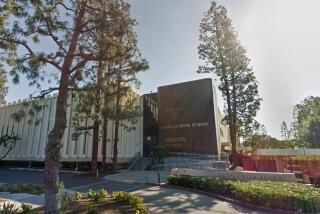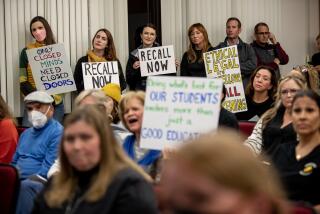Many of L.A. Unified’s iPad project wounds are self-inflicted
The Los Angeles Unified School District has done the public, itself and, most of all, its students a grave disservice with the changing costs and information disseminated about the project to provide every pupil with an iPad. The loss of faith has been tremendous and might hurt the entire project in major ways. That would be a shame. For all the people who decry the district’s intentions of making a big technology purchase, the students of L.A. Unified need regular access to computer devices, whether desktops, laptops or tablets.
But the district has an obligation to plan the purchases well, use taxpayer money prudently and lay out clearly what the costs and agreements are. It’s also important to assess whether the district is getting its money’s worth in terms of improved learning before the entire lot of 650,000 devices is purchased. District administrators act as though they’re under fire only because of luddites, the media and the teachers union, but they have provided some of the best arguments against their own plans.
It happened most recently, as Times staff writer Howard Blume reported, when district administrators this week revealed that the contract for the curriculum software bundled into the iPads is only good for three years. If the devices themselves go on to have a longer life, the district must pay as much as $60 million a year to have access to the math and language curriculums.
We’ve obviously come a long way from the days of textbooks, which were good for as long as the binding held and the text wasn’t hopelessly outdated. But that’s not the point. According to Blume’s story, district administrators had previously assured board members that the curriculum had been purchased, not rented, and would belong to the district after the three-year contract.
This isn’t the first time on the iPad project that administrators have offered up reassuring-sounding explanations at first, only to have matters turn out differently. Still unresolved: Can students take them home if they are purchased with bond money, which is intended for durable goods at school? At a recent meeting, school board members were even talking about letting at least some students keep the tablets during summers; schools generally don’t let textbooks stay with students during the summer unless it’s for specific study purposes. Would the students have summer assignments to do on those tablets, or is the idea that they should have year-round access to the Internet, just as more privileged youngsters do? No one has yet offered a reasonable justification for this idea.
It would be unfair to expect perfect accuracy and a glitchless rollout of the iPad project. Some numbers won’t work out. Some plans will go awry. Doing something big and new entails some risk. Students can do innovative schoolwork on the devices, carry “textbooks” without the heavy books, seamlessly integrate classroom work and homework, and have available a literal world of information and exciting interactive lessons. Many of the people who protest any sort of major technology purchase are unaware that knowledge of these devices and their common software is a basic of college life. And interestingly, many of them register their protests via email and online comment, via the devices and Internet to which they regularly have access.
The problem is that, so far, the glitches with the iPad project have been rolling out faster than the project itself.
ALSO:
Goldberg: Oprah, Obama and the racism dodge
A California-style fix for Obamacare’s runaway premiums
Fear and loathing and cycling in L.A.: Tales of a bike commuter
More to Read
A cure for the common opinion
Get thought-provoking perspectives with our weekly newsletter.
You may occasionally receive promotional content from the Los Angeles Times.







